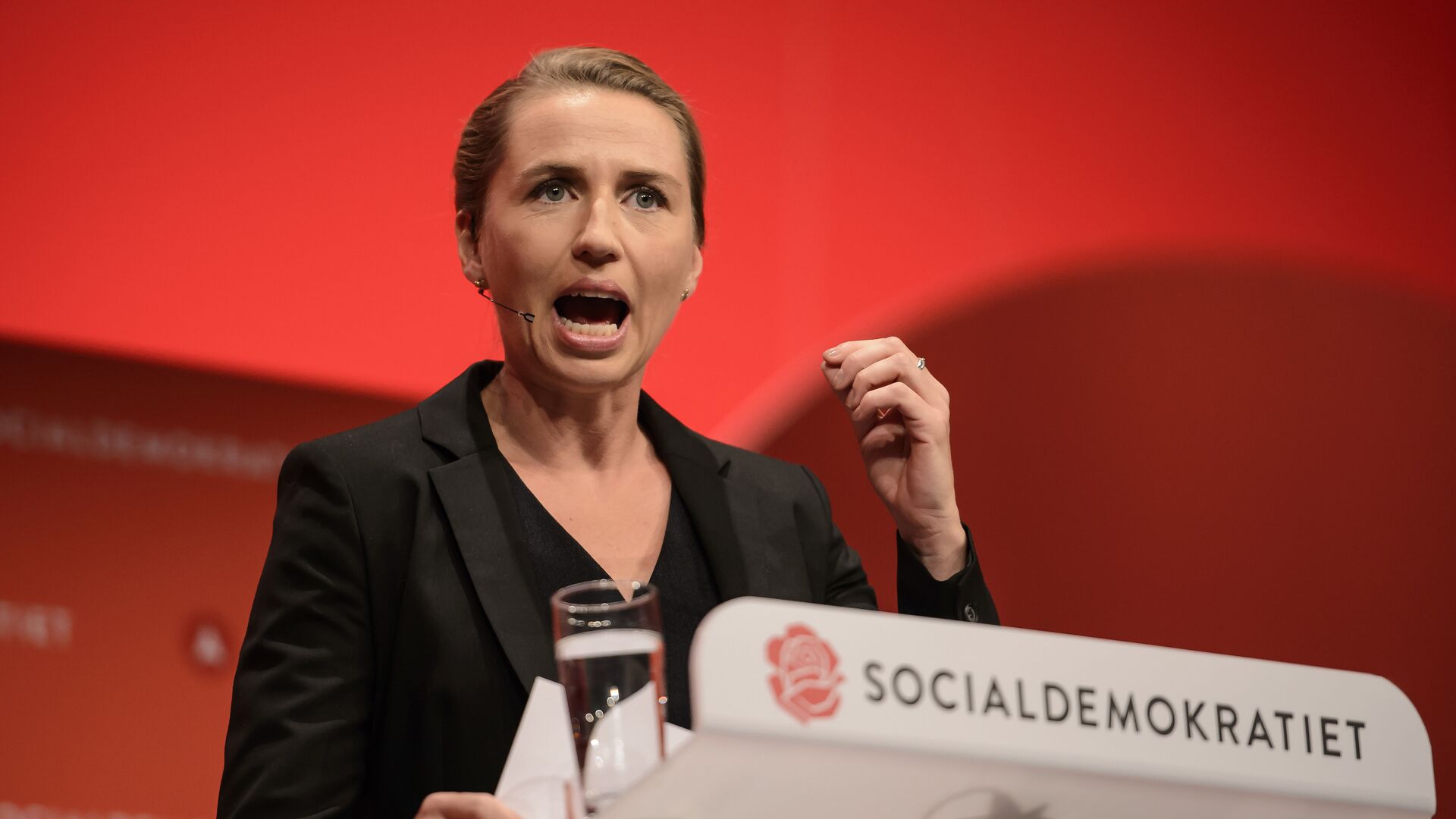https://sputnikglobe.com/20221214/danish-pm-under-fire-from-left-wing-sidekicks-for-aligning-with-arch-enemies-1105438059.html
Danish PM Under Fire From Left-Wing Sidekicks For Aligning With Arch-Enemies
Danish PM Under Fire From Left-Wing Sidekicks For Aligning With Arch-Enemies
Sputnik International
Denmark’s new government marks a rare departure from the traditional two-bloc system, where the “reds” and the “blues” rule the country in turns. However, it... 14.12.2022, Sputnik International
2022-12-14T08:17+0000
2022-12-14T08:17+0000
2022-12-14T08:17+0000
world
scandinavia
news
denmark
mette frederiksen
social democrats
https://cdn1.img.sputnikglobe.com/img/106139/07/1061390767_0:0:4357:2452_1920x0_80_0_0_4070706c0724ed59825940a41d8e4948.jpg
After a record six weeks of negotiations, Danish Prime Minister and Social Democrat leader Mette Frederiksen has announced the formation of a new government.It took a total of 43 days to agree on the new government after a highly contested election, but this is not the only outstanding thing about the election. The cross-bloc coalition paradoxically unites the Social Democrats’ perennial arch-rivals the liberal-conservative Venstre (also known as the Liberals) as well as the newly formed Moderate Party built around former Venstre leader and former Prime Minister Lars Lokke Rasmussen, who made a triumphant comeback to Danish politics. The coalition became a reality despite Venstre leader Jakob Ellemann-Jensen, the son of former Foreign Minister Uffe Ellemann-Jensen, initially dismissing the idea of collabortation directly after the election, only to perform a U-turn weeks after.While praising the coalition as a historic meeting point of former competitors, as the three parties have never worked together before and often disagree, political analysts predicted stiff headwinds for the new government, with a number of heavy and unpopular decisions ahead amid energy and cost-of-living crises. Only once before in 1978 have the Social Democrats and Venstre been part of the same government - and that was far from successful.The formation of the new government was not met with rejoicing by the Social Democrats’ former left-wing allies from the “red” bloc, who felt unfairly abandoned despite gaining a majority together, and switched to the opposition.Alternative Party leader Franciska Rosenkilde also expressed dissatisfaction, calling the decision “not a surprise, but still deeply regrettable”.Red-Green Alliance leader Mai Villadsen accused Frederiksen of making a “violent turn to the right” despite gaining a majority together with her former sidekicks and calling it “hugely wrong”.Nail-biter Election in the Shadow of 'Minkgate'This autumn's election in which the “red” left-wing bloc was able to secure a slim majority has been described as a nail-biter, as its fate was ultimately decided by votes cast in the Faroe Islands and Greenland, which are remote parts of the Danish Realm. However, even during the election campaign, Mette Frederiksen said that she was looking for a government across the bloc borders, which the junior support parties from both sides strictly opposed.The Venstre, the traditional pillar of the right-wing “blue” bloc, had a poor showing at merely 13.3 percent, their worst performance in decades, as they found themselves challenged by both Lokke Rasmussen’s centrist Moderates and more radical right-wing newcomers such as the New Right and the Denmark Democrats.The Danish election campaign has been described as the first in a long time in which immigration policy was not a focal point. Instead, the campaign was marked by both allies and rivals of Frederiksen calling on her to take responsibility for the decision to slaughter all the country’s 15 million mink in a ham-fisted bid to tackle COVID-19. However, both the Venstre and the Moderates effectively backtracked and abandoned their initial demand for a legal assessment of the case, in effect putting “Minkgate” to rest. Pundits subsequently warned that this could result in a serious breach of voters’ trust.
https://sputnikglobe.com/20221206/denmark-braced-for-record-number-of-bankruptcies-as-inflation-and-energy-crisis-bite-1105083668.html
scandinavia
denmark
Sputnik International
feedback@sputniknews.com
+74956456601
MIA „Rossiya Segodnya“
2022
News
en_EN
Sputnik International
feedback@sputniknews.com
+74956456601
MIA „Rossiya Segodnya“
Sputnik International
feedback@sputniknews.com
+74956456601
MIA „Rossiya Segodnya“
danish government, social democrats, danish prime minister mette frederiksen, former prime minister lars lokke rasmussen, cross-bloc coalition
danish government, social democrats, danish prime minister mette frederiksen, former prime minister lars lokke rasmussen, cross-bloc coalition
Danish PM Under Fire From Left-Wing Sidekicks For Aligning With Arch-Enemies
Denmark’s new government marks a rare departure from the traditional two-bloc system, where the “reds” and the “blues” rule the country in turns. However, it has sparked ire on both sides of the political spectrum and has already agreed concessions that may result in a breach of voters’ trust.
After a record six weeks of negotiations, Danish Prime Minister and Social Democrat leader Mette Frederiksen has announced the formation of a new government.
It took a total of 43 days to agree on the new government after a highly contested election, but this is not the only outstanding thing about the election. The cross-bloc coalition paradoxically unites the Social Democrats’ perennial arch-rivals the liberal-conservative Venstre (also known as the Liberals) as well as the newly formed Moderate Party built around former Venstre leader and former Prime Minister Lars Lokke Rasmussen, who made a triumphant comeback to Danish politics. The coalition became a reality despite Venstre leader Jakob Ellemann-Jensen, the son of former Foreign Minister Uffe Ellemann-Jensen, initially dismissing the idea of collabortation directly after the election, only to perform a U-turn weeks after.
“The fact that different parties come together in a government doesn’t necessarily mean that we agree on everything, but that we choose to enter into a working community with each other because that is the most important thing for our country”, Mette Frederiksen said.
While praising the coalition as a historic meeting point of former competitors, as the three parties have never worked together before and often disagree, political analysts predicted stiff headwinds for the new government, with a number of heavy and unpopular decisions ahead amid energy and cost-of-living crises. Only once before in 1978 have the Social Democrats and Venstre been part of the same government - and that was far from successful.

6 December 2022, 07:06 GMT
The formation of the new government was not met with rejoicing by the Social Democrats’ former left-wing allies from the “red” bloc, who felt unfairly abandoned despite gaining a majority together, and switched to the opposition.
“Denmark doesn't need a government across the middle. Denmark needs a government that solves the climate and nature crisis, the dissatisfaction of children and young people, helps the many who have the least. Unfortunately, that is not what we will get tomorrow,” Pia Olsen Dyhr, the leader of the Socialist People's Party, told Danish media, pledging to use all the clout she has as Denmark’s largest opposition party to push the government into a “greener” direction toward “more solidarity”.
Alternative Party leader Franciska Rosenkilde also expressed dissatisfaction, calling the decision “not a surprise, but still deeply regrettable”.
Red-Green Alliance leader Mai Villadsen accused Frederiksen of making a “violent turn to the right” despite gaining a majority together with her former sidekicks and calling it “hugely wrong”.
Nail-biter Election in the Shadow of 'Minkgate'
This autumn's election in which the “red” left-wing bloc was able to secure a slim majority has been described as a nail-biter, as its fate was
ultimately decided by votes cast in the Faroe Islands and Greenland, which are remote parts of the Danish Realm. However, even during the election campaign, Mette Frederiksen said that she was looking for a government across the bloc borders, which the junior support parties from both sides strictly opposed.
The Venstre, the traditional pillar of the right-wing “blue” bloc, had a poor showing at merely 13.3 percent, their worst performance in decades, as they found themselves challenged by both Lokke Rasmussen’s centrist Moderates and more radical right-wing newcomers such as the New Right and the Denmark Democrats.
The Danish election campaign has been described as the first in a long time in which immigration policy was not a focal point. Instead, the campaign was marked by both allies and rivals of Frederiksen calling on her to take responsibility for the decision to slaughter all the country’s 15 million mink in a ham-fisted bid to tackle COVID-19. However, both the Venstre and the Moderates effectively backtracked and abandoned their initial demand for a legal assessment of the case, in effect putting “Minkgate” to rest. Pundits subsequently warned that this could result in a serious breach of voters’ trust.



